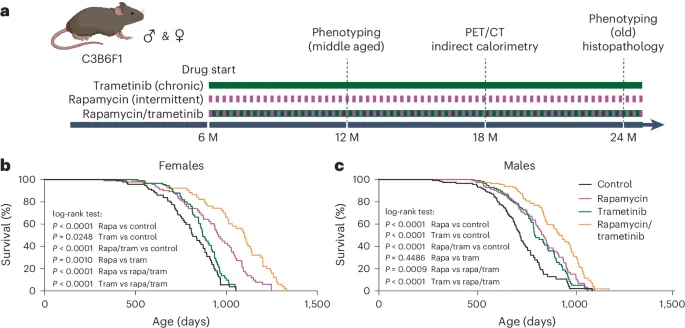
Scientists Extend Mouse Lifespan by 30% with Cancer Drug Combo: A Breakthrough or Biohacking Hype?
The quest for longevity has taken a fascinating turn with new research suggesting a potential avenue for extending lifespan. Scientists at the Max Planck Institute for Biology of Aging have discovered that a combination of two FDA-approved cancer drugs, trametinib and rapamycin, can extend the lives of mice by approximately 30%. This finding has sparked interest and debate, particularly within the biohacking community.
The Power of Two: Trametinib and Rapamycin
The study, published recently in Nature Aging, reveals that the synergistic effect of trametinib and rapamycin goes beyond what either drug can achieve individually. While rapamycin, an immunosuppressant, has been previously shown to extend mouse lifespan by 15% to 20% by inhibiting the mTOR pathway, its use has been controversial due to significant side effects.

Rapamycin's Double-Edged Sword
Rapamycin's mechanism involves regulating critical bodily functions like protein synthesis and the clearance of senescent, or "zombie," cells. However, its immunosuppressive properties can lead to increased infection risk, elevated cholesterol and triglyceride levels, gastrointestinal issues, and other adverse effects. Bryan Johnson, a prominent figure in the anti-aging movement, even discontinued his rapamycin regimen after five years, citing these side effects as outweighing the potential benefits.
Trametinib's Role in the Combo
Trametinib, primarily used to treat melanoma and low-grade glioma, interferes with signals that promote cancer cell multiplication. On its own, trametinib extended mouse lifespan by 5% to 10%, but when combined with rapamycin, the results were significantly enhanced.

Gene Expression and Health Benefits
The combined therapy influenced gene expression differently than either drug alone, leading to decreased inflammation in tissues and the brain, as well as delayed tumor growth. Sebastian Grönke, a study author, suggested that "trametinib, especially in combination with rapamycin, is a good candidate to be tested in clinical trials as a geroprotector."

Researchers analyzed various health parameters and found significant improvements in mice treated with the combination, including reduced age-related decline in heart function and decreased inflammation.

Cautious Optimism
While the results are promising, researchers emphasize the need for caution. Linda Partridge, co-senior author, noted, "While we do not expect a similar extension to human lifespans as we found in mice, we hope that the drugs we’re investigating could help people to stay healthy and disease-free for longer late in life." She called for further research in humans to elucidate the potential benefits and risks.

The Future of Geroprotectors
This study adds to the growing body of research exploring pharmacological interventions to combat aging. However, it also highlights the complexities and potential pitfalls of such approaches, with the need for rigorous clinical trials to determine the safety and efficacy of these drugs in humans.

As scientists delve deeper into the molecular mechanisms of aging, the potential for developing safe and effective geroprotectors becomes increasingly realistic. However, the critical question remains: Can these interventions truly translate into longer, healthier lives for humans, or are they just another biohacking fad?

What are your thoughts on using drugs like trametinib and rapamycin for anti-aging purposes? Share your opinions and insights in the comments below!